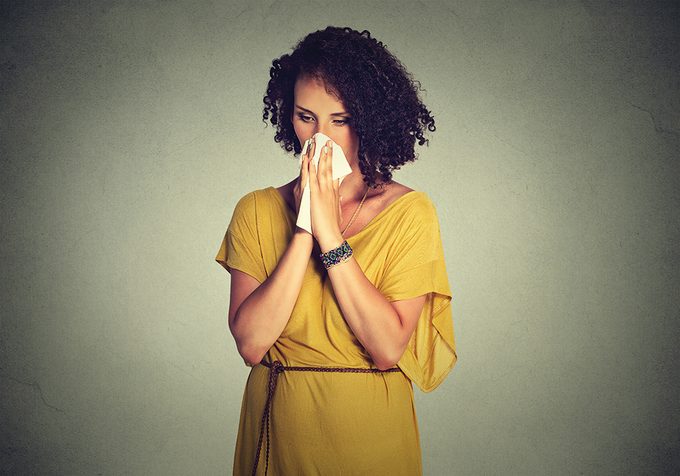Expert Nosebleed Prevention Tips You Wish Your Mother Told You
Stop pesky nosebleeds right in their tracks with our expert advice.

The Rhinologist Says…
There are all kinds of myths about how to stop nosebleeds, but the most important thing to do when you’re bleeding is to put consistent pressure on your nose. Most bleeds occur at the front of the nose, below the bones, in an area called the septum, which is supplied by five blood vessels. Squeeze the nose to apply pressure to the septum and lean forward for 10 minutes, resisting the urge to check if the bleeding has stopped. Applying direct pressure to the arteries of the septum allows the body’s natural clotting abilities to control the bleeding. If the bleeding hasn’t stopped after 10 minutes, apply pressure for another 10 minutes. If it hasn’t stopped after 20 or 30 minutes, get to a doctor to help stop the bleeding.
Nosebleed Causes & Treatments
Once the bleeding has stopped, it’s time to address the underlying problem. Most nosebleeds are caused by your fingers in your nose – even in adults. But many traumas, such as blowing or rubbing the nose too hard or undergoing a sports injury, can lead to bleeding. Allergy sufferers who use nasal sprays might run into problems if they’re shooting the spray at the septum instead of into the nasal cavity. Another common cause is dryness. In the winter, heating in our homes and workplaces can parch the nasal mucosa, making it vulnerable to cracking.
Moisture is key to healing and preventing most nosebleeds. Using an over-the-counter saline spray or gel at night and up to three times a day can provide moisture to help soothe the nasal cavity and prevent further bleeding. A humidifier can also help.
Too Many Nosebleeds?
If you’re getting significant or frequent nosebleeds, a broken blood vessel could be to blame. Your family doctor or specialist can cauterize it to prevent future bleeds. Certain medications, especially blood thinners, can also increase the likelihood of nosebleeds. Anticoagulants can also increase the length and severity of nosebleeds. If that still doesn’t explain an ongoing problem, I would explore possible substance abuse issues. (Using drugs like cocaine can erode the lining of the nose and lead to chronic bleeds.)
If you’ve taken steps to prevent nosebleeds and they continue to occur, your doctor can refer you to an otolaryngologist, who will use tools to look deeper into the nose for growths, infections or tumours.
Dr. Casey Manarey is a rhinologist in Burnaby, BC
The Naturopathic Doctor Says..
Pinch and Lean
When your nose is bleeding, pinch the nasal passage closed with your fingers and add a cold compress. Pinching the nasal passage blocks the blood vessels, while the compress constricts blood flow. Lean forward to bring your chin to your chest. Don’t tip your head back, as blood can run down your throat and irritate the lungs, causing you to cough or choke.
Why Your Nose Is Bleeding
Common causes of nosebleeds are dry weather, upper respiratory infections and allergies, but other lifestyle factors, such as smoking, can also dry out the nasal cavity. Trauma to the nose is another consideration. The sneezing fits and nose blowing brought on by colds and allergies put pressure on the lining of the nose and can rupture fragile blood vessels.
After assessing factors specific to your situation, I might recommend a humidifier and saline spray for dry weather or look for the root causes of your allergies or upper respiratory infections. The immune system is intrinsically tied to digestion. In naturopathic medicine, we explore how that connection impacts overall wellness, so I’d ask about your diet and digestion. I might recommend increasing nutrients such as vitamin C, which is integral to collagen synthesis and helps repair blood vessels, as well as vitamin K, which can aid in blood clotting. You can get these through supplements or foods (think brightly coloured vegetables for vitamin C and dark leafy greens for vitamin K), but you shouldn’t take vitamin K if you’re on blood thinners. Finally, I might recommend a constitutional homeopathic remedy to treat the individual as a whole rather than simply the nosebleeds.
Other Nosebleed Factors
If these steps don’t clear up your nosebleeds, I would consider other risk factors, such as high blood pressure (which can increase bleeding) and alcoholism (which thins the blood) and treat those problems. In rare cases, cancer or a bleeding disorder might be to blame, so I might look for signs of a tumour in the nasal passageway or systemic symptoms of cancer and inquire about how well small cuts heal on you or whether you have heavy menstrual bleeding or bruise easily. Finally, I may test for anemia, which can lead to excessive bleeding because iron-deprived blood isn’t thick and hearty enough to function as optimally as healthy red blood cells do.
Dr. Jill Kazuk is a naturopathic doctor at the Winnipeg Naturopathic Clinic




